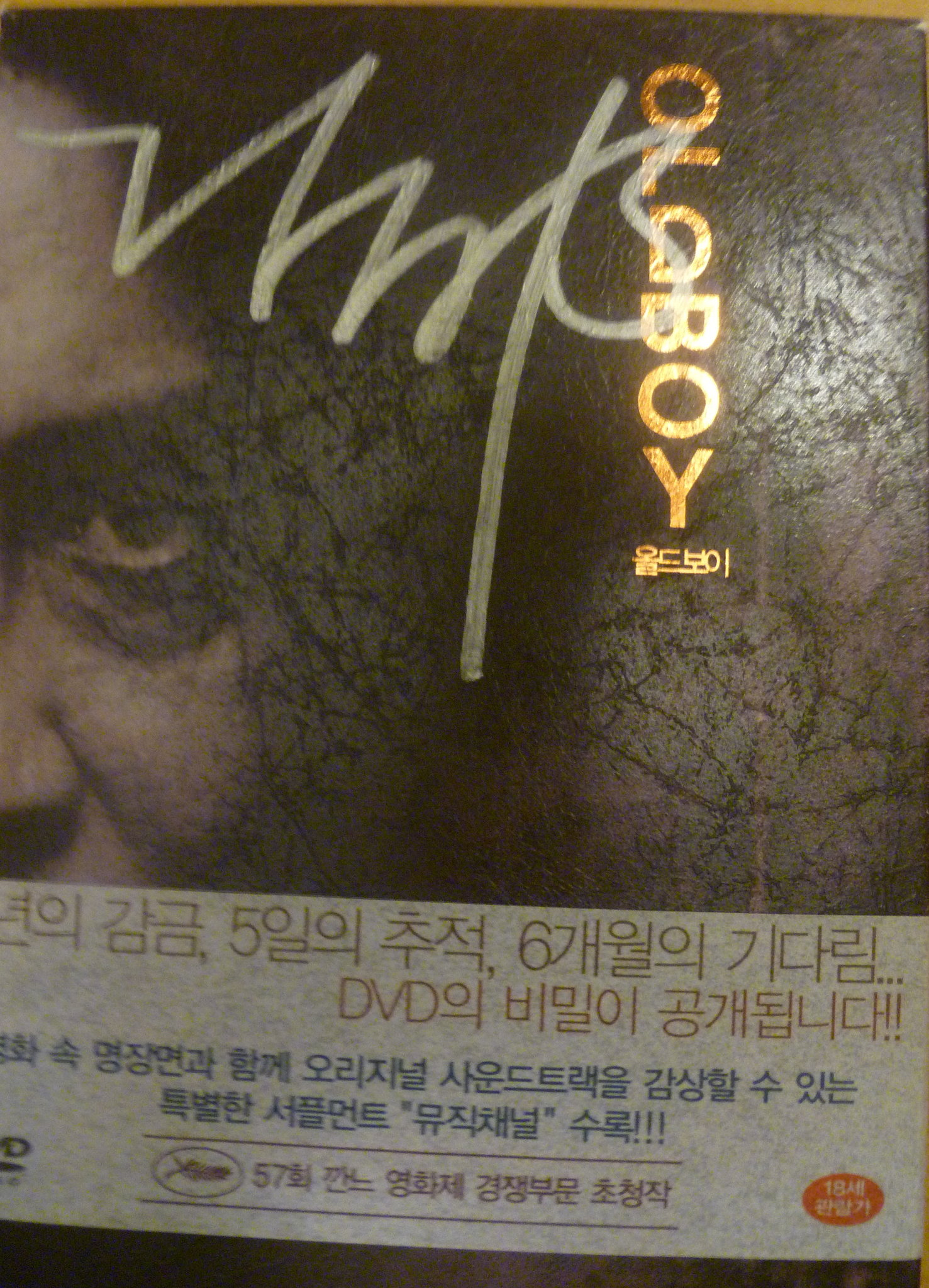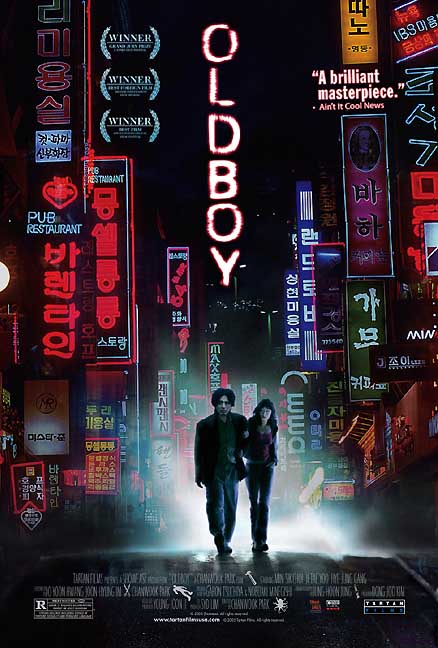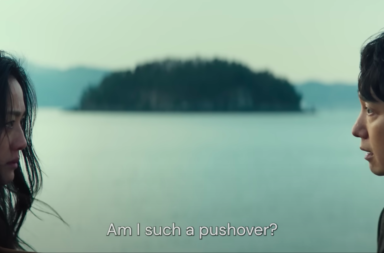 Old Boy is one of the most infamous Korean films of all time. It has all the trappings of a classic: it has an engaging story with great performances, some well-known and memorable scenes, and enough twists and turns to open up hours of discussion. I’ve briefly hinted at my opinion of Old Boy in my reviews of the other two parts of Park Chan-Wook’s “Revenge Trilogy,” but will use this post to provide a more detailed review.
Old Boy is one of the most infamous Korean films of all time. It has all the trappings of a classic: it has an engaging story with great performances, some well-known and memorable scenes, and enough twists and turns to open up hours of discussion. I’ve briefly hinted at my opinion of Old Boy in my reviews of the other two parts of Park Chan-Wook’s “Revenge Trilogy,” but will use this post to provide a more detailed review.
For starters I want to state that I do not plan to avoid spoilers in this article. I’m doing this for a couple reasons: firstly as I already mentioned the movie is very well known and discussed. If somehow you’ve made it this long avoiding any spoilers, and have an interest in the movie, I suggest you stop reading now and track down a copy of the movie and watch it. Although I feel it’s Park’s weakest “Revenge” movie, it is still good and if you are a movie fan it’s well worth checking out.
The photo at right is a picture of my personal copy of Old Boy. If my house were on fire (and my family were safe) and I could only take with me whatever I could carry in my arms, this would be the only DVD in my hands, the reason being that it’s the only irreplaceable DVD I have. Firstly the DVD is the original pressing released in South Korea that only had a very short run, and then was discontinued. Secondly that scribble on the cover in Park Chan-Wook’s autograph that I got when I met him in person at a signing in New York City a few years ago.
My Old Boy story starts back in 2003 when Old Boy was just released into Korean cinemas. At this time I was a daily reader of a now defunct Asian cinema movie site, and one day they posted a review for the film Old Boy. I was very interested, firstly because it was not normal for the site to post reviews of movies that were still in theaters in their native country. The other thing that perked my interest was the fact that the review was extremely positive, almost over-the-top in its praise. After reading it I could hardly wait to get a copy and check it out. I kept tracking various Korean DVD import stores online waiting for the pre-order to go up, and after months when it finally did I pre-ordered it without a second thought.
Park Chan-Wook had no significance to me at the time, and honestly neither did Choi Min-Sik. I had no real expectations, and at the time had seen no other review other than the original glowing one that intrigued me to begin with.
On my first viewing, I can say that the movie is shocking for certain. When you enter the movie it at first really only appears that it’s the tale of one person’s revenge. Oh Dae-su (played by Choi) appears to be randomly abducted one night, and held prisoner for years in a small room. We don’t know much about Dae-su, other than appearing to be a bit of a wise guy and a bad drunk, but that’s pretty much it.
 We watch the years pass by in bits and pieces and watch the struggles he goes through trying to figure out how and why this happened to him. One day he wakes up in a box on a roof a building, he’s been let free, and now that he’s free he makes it his goal to track down the person who did this to him and get revenge. This is really the selling point of the film, Dae-su and his revenge. What’s not plain to see from the advertising is that there is another side to this revenge story, Lee Woo-jin (played by Yoo Ji-tae) arranged for Dae-su imprisonment as an act of revenge for Dae-su’s “loose tongue.”
We watch the years pass by in bits and pieces and watch the struggles he goes through trying to figure out how and why this happened to him. One day he wakes up in a box on a roof a building, he’s been let free, and now that he’s free he makes it his goal to track down the person who did this to him and get revenge. This is really the selling point of the film, Dae-su and his revenge. What’s not plain to see from the advertising is that there is another side to this revenge story, Lee Woo-jin (played by Yoo Ji-tae) arranged for Dae-su imprisonment as an act of revenge for Dae-su’s “loose tongue.”
This is where some of the more controversial aspects of the movie start to come into play. We learn through the course of the movie that when Woo-jin was a teenager he was involved with an incestious relationship with his sister, Soo-ah. A teenage Dae-su happen to catch the two of them in the act, and made an offhanded comment to one of his friends about Soo-ah being “easy” (not mentioning the incest at all, likely because he didn’t even realize it was). Dae-su’s friend spread the rumors, which ended up bringing shame upon Soo-ah, which in the end brought her to commit suicide from jumping off a bridge.
Ever since that day Woo-jin has been heart broken, having lost his only love, and worked to create a plan to get revenge on the person who caused the rumors to begin. During Dae-su’s time imprisoned he created a list (books worth) of every person he could think of that he wronged, but due to how completely flippant his comment was to his friend this event never came into his mind. The movie does present a very interesting idea that sometimes even the most innocent, and seemingly insignificant things that we do could have a much larger impact on the lives of those around us. Dae-su never for a moment would have thought his comment would have caused a person to take their own life, it’s similar to the “butterfly effect” theory in that regard.
Woo-jin’s revenge is not as simple as locking Dae-su away for many years: it’s not as “simple” as debasing him and breaking him down to “less than human”. Woo-jin constructs a whole scenerio for Dae-su to cause him to fall into a situation where he unknowingly meets his daughter (played by Kang Hye-jeong), who he hasn’t seen since prior to being locked away, and fall in love, and even get to point of engaging in sexual activity with her. We, as the audience, are left in the dark on this aspect of the revenge until the end of the movie, and the moment is shocking; it’s one of those film moments that hits you like a ton of bricks. As Dae-su learns the information there’s a mix of shock, fear and anger. Lastly we are presented with a final scene in which we see Dae-su working with a hypnotist to remove the knowledge of the fact that the woman he’s fallen in love with his daughter. This final scene has caused some discussion, some wondering if Dae-su truly had the memories wiped from his mind, some stating that he must have. Dae-su’s wide grin in the last shot is hard to fully understand, but regardless of the opinion you take on the ending the fact is that Dae-su did make a decision to continue this relationship with his daughter knowing full well what he was doing. This does shine a lot of light on the character of Dae-su, or at least what he’s become.
While we are speaking about the hypnotist, this introduces one of the aspect of the movies that I dislike the most. I am not saying that every movie must be completely realistic, but this aspect of the movie pulled me out of Old Boy. With all respect to Park Chan-Wook, I think using hypnotism is a cheap parlor trick, and damages the movie. Woo-jin’s use of hypnotism to create scenarios for Dae-su and his daughter to meet and fall in love just screams to me that Park Chan-Wook had some ideas while writing the film but did not know how to tie it together. It doesn’t destroy the movie, but it does hurt it a lot.
The movie was beautifully shot, from a technical standpoint it’s a great step forward from Mr. Vengeance. All actors provide amazing and well done performances. The movie has some great and memorable scenes, I’d be remiss to not mention the greatly choreographed hallway fight scene, the shocking octopus eating scene, teeth pulling, tongue cutting and all other matters of insanity that appear on screen.
This is a movie that will be remembered and discussed for years to come, and rightly so. This movie is not, however, Park Chan-Wook’s finest work. It’s a movie that lacks the subtlety, maturity, and complexity of Lady Vengeance. It’s a movie that lacks the heart, grittiness and “gutsy inexperience” that was so appealing to Mr. Vengeance. Due to the hypnosis aspect, it’s also the only of the three revenge films that takes the easy way out, the story plays almost like an annoying deus ex machina, and honestly it’s a cheap trick that could have been avoided completely with some minor tweaks to the story.
As I mentioned earlier, I’ve seen Old Boy a lot of times. I’ve shared it with others, read reviews, posted on forums, and seen the movie many more times since. It’s a movie that sticks with you, and it’s an important film for cinema in general, and Korean cinema in particular.


